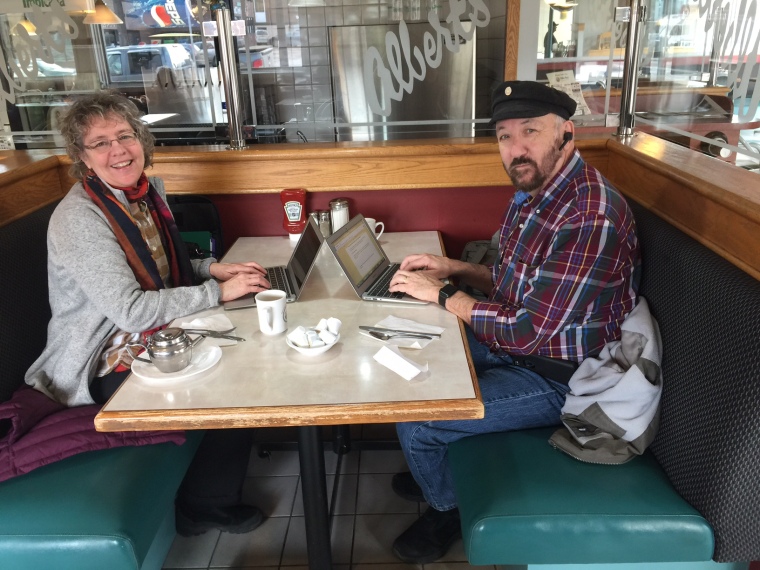Diablogue #18

Helpful hint: Be generous of heart to those who unknowingly torment you. They know not what they do. Keep working to forgive and educate. Education and connection are the death of ignorance and torment.
So, let’s diablogue:
Christina: This is a touchy topic.
Ken: That is correct. And perhaps somewhat controversial.
Christina: Controversial?
Ken: Controversial in that the majority of the torment of Aspies is unconscious and thereby unintentional.
Christina: You mean that people don’t like to hear that they are doing it… or they won’t really believe it?
Ken: Both.
Christina: Example?
Ken: People keep unwritten scorecards on each other. When I start a friendship, or a job, things are equal. Then I start to question things. Or ask for things I need. They start to judge me and see me as annoying, threatening to their position or authority, intense, overbearing, or just plain odd—but not in a good way. I will start to lose points on their scorecard and become lesser in their eyes.
Christina: They stop picking you for the team.
Ken: Fall out of favour. Consider me last when they have tickets to give away. Start subconsciously avoiding me and stop asking for my opinion or advice. Exclude me from the loop. Sabotage my efforts. Try to discredit me. Pass me over for promotions.
Christina: This happens lots then.
Ken: These kinds of reactions and behaviours have happened multiple times in multiple different scenarios for as long as I can recall.
Christina: Slow, steady, disconnection from people.
Ken: In these instances I redouble my efforts and try harder to regain points and return to their favour.
Christina: Does it work?
Ken: Often it has the reverse effect. In trying to even the scorecard, I overcompensate.
Christina: They think you are showing off or climbing the ladder or one-upping them— or something else that’s not true.
Ken: Correct. Thereby, instead of gaining back the points, I lose even more.
Christina: And over time…
Ken: I lose friends, colleagues will interact with me less, and I lose employment.
Christina: Serious.
Ken: In my view, because of who I am, I have to work twice as hard to get half as far ahead. And the end result is that I work twice as hard and fall twice as far behind.
Christina: I can’t even follow that! But it sounds destructive.
Ken: It becomes immoral and unethical.
Christina: You mean others’ behaviours towards you?
Ken: Correct.
Christina: But they don’t know they’re doing it, usually. I think it goes back to the natural tribal response of disassociating with others who are not like us in some way. In your case it’s very subtle. Social differences, multiple small social infractions—some even too small to notice. They pile up and cause a natural human aversion response.
Ken: Eloquently put. I could not have said it any better. In most instances, it is never overt, mean-spirited, or hateful. Your word subtle captures it perfectly. I would only add two words to that, which are “unconscious and unintentional”—very few people directly target me. It just happens.
Christina: So my question to you is, is it really unethical and immoral if it’s unconscious?
Ken: Yes. Because the outcome is the same. The truth is that ethics and morals have been breached. I’m talking about fairness, equality, and inclusion of all.
Christina: No matter what the cognitive diversity—or any diversity.
Ken: Absolutely.
Christina: Do you ever just tell people what’s actually going on—as you see it?
Ken: Yes, when I become overwhelmed and it has become the straw that has broken the camel’s back.
Christina: How does it go over?
Ken: Often not well. Most believe themselves to be, and genuinely are, quite ethical and moral. So, when I inform them that they are behaving in a less than ethical or moral manner, it shocks them. First they don’t believe it, then they become hurt, then they deny it, and then they become defensive.
Christina: And finally…
Ken: This is when the truly unethical and immoral treatment surfaces. They ostracise me or strike out in some of the ways I previously mentioned.
Christina: That’s the torture in our headline.
Ken: Or rather, torment. Torture is a bit strong.
Christina: Although when I see the effects—your anxiety and depression and self-flagellation, I would say it’s not too strong.
Ken: Perhaps.
Christina: Low self-esteem is chronic in Aspies.
Ken: Correct. However, this phenomenon is just one of many causes.
Christina: Ok. I really think we need to lighten up for next blog!
Ken: Perhaps we should talk about my odd and broad sense of humour.
Christina: Bad jokes, puns, and incessant wordplay included? Sounds funny!
Next post #19 ~ “Aspies’ Odd and Broad Sense of Humour”



